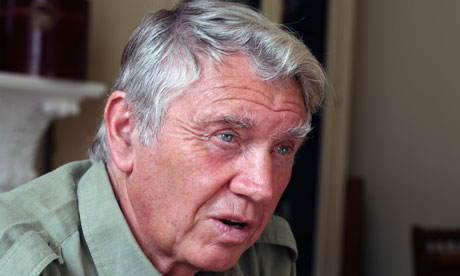
Photographer Don McCullin's view is that war must be shown
whole and shocking. Photo: Eamonn McCabe
whole and shocking. Photo: Eamonn McCabe
A baby girl with half her skull hacked away; a young boy "with
the
back of his head lopped like a boiled egg"; a pretty girl with, "above
her right eye, a large bloody bullet hole surrounded by a mess of
flesh and bone". These pictures, and many more like them, "were
far too shocking to print in the Times, though our failure to do so
spares the Assad regime".
Thus, Martin Fletcher in his brilliant front page report on "The
Tipping Point" for western revulsion over the Houla massacre in
Syria last week – and an inevitable question. What is far too
shocking to print? Does one tasteful RIP shot of a murdered
toddler do the job?
And, by happenstance, an answer comes in McCullin, a new film
about the searing war photographs Don McCullin took for the
Sunday Times and the Observer three and more decades ago.
Don worked in black and white. He never flinched over killings
piled high. His view of war was and is that war is so shocking
it must be shown whole. And then came a moment when even
a preview audience of journalists winced: a young Biafran mother,
her breasts hanging loose like empty sacks; a baby in the final
stage of death.
Too searing, too dreadful for comfort? Only if your own snug
cocoon of ignorance is more important than feeling humanity's
pain.
back of his head lopped like a boiled egg"; a pretty girl with, "above
her right eye, a large bloody bullet hole surrounded by a mess of
flesh and bone". These pictures, and many more like them, "were
far too shocking to print in the Times, though our failure to do so
spares the Assad regime".
Thus, Martin Fletcher in his brilliant front page report on "The
Tipping Point" for western revulsion over the Houla massacre in
Syria last week – and an inevitable question. What is far too
shocking to print? Does one tasteful RIP shot of a murdered
toddler do the job?
And, by happenstance, an answer comes in McCullin, a new film
about the searing war photographs Don McCullin took for the
Sunday Times and the Observer three and more decades ago.
Don worked in black and white. He never flinched over killings
piled high. His view of war was and is that war is so shocking
it must be shown whole. And then came a moment when even
a preview audience of journalists winced: a young Biafran mother,
her breasts hanging loose like empty sacks; a baby in the final
stage of death.
Too searing, too dreadful for comfort? Only if your own snug
cocoon of ignorance is more important than feeling humanity's
pain.

No comments:
Post a Comment